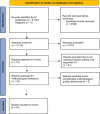Conflicting attitudes between clinicians and women regarding maternal requested caesarean section: a qualitative evidence synthesis
- PMID: 36978038
- PMCID: PMC10044365
- DOI: 10.1186/s12884-023-05471-2
Conflicting attitudes between clinicians and women regarding maternal requested caesarean section: a qualitative evidence synthesis
Abstract
Background: Caesarean section (CS) can be a life-saving operation but might also negatively affect the health of both the woman and the baby. The aim of this study was to synthesize and contrast women's and clinicians' attitudes toward maternal-requested CS, and their experiences of the decision-making process around CS.
Methods: The databases of CINAHL, MEDLINE, PsycInfo and Scopus were screened. All qualitative studies that answered the study question and that were assessed to have minor or moderate methodological limitations were included. Synthesised findings were assessed using GRADE-CERQual.
Results: The Qualitative Evidence Synthesis included 14 qualitative studies (published 2000-2022), involving 242 women and 141 clinicians. From the women's perspectives, two themes arose: women regarded CS as the safest mode of birth; and women's rights to receive support and acceptance for a CS request. From the clinicians' perspectives, four themes emerged: clinicians were concerned about health risks associated with CS; demanding experience to consult women with a CS request; conflicting attitudes about women's rights to choose a CS; and the importance of respectful and constructive dialogue about birthing options.
Conclusion: Women and clinicians often had different perceptions regarding the right of a woman to choose CS, the risks associated with CS, and the kind of support that should be part of the decision-making process. While women expected to receive acceptance for their CS request, clinicians perceived that their role was to support the woman in the decision-making process through consultation and discussion. While clinicians thought it was important to show respect for a woman's birth preferences, they also felt the need to resist a woman's request for CS and encourage her to give birth vaginally due to the associated increases in health risks.
Keywords: Caesarean section; Clinicians; Maternal request; Non-medical; Qualitative evidence synthesis.
© 2023. The Author(s).
Conflict of interest statement
No interest of conflicts to declare.
Figures


Similar articles
-
Prevalence of and reasons for women's, family members', and health professionals' preferences for cesarean section in China: A mixed-methods systematic review.PLoS Med. 2018 Oct 16;15(10):e1002672. doi: 10.1371/journal.pmed.1002672. eCollection 2018 Oct. PLoS Med. 2018. PMID: 30325928 Free PMC article.
-
Caesarean section on maternal request: a qualitative study of conflicts related to shared decision-making and person-centred care in Sweden.Reprod Health. 2024 Jul 2;21(1):97. doi: 10.1186/s12978-024-01831-z. Reprod Health. 2024. PMID: 38956635 Free PMC article.
-
Women's decision-making processes and the influences on their mode of birth following a previous caesarean section in Taiwan: a qualitative study.BMC Pregnancy Childbirth. 2018 Jan 17;18(1):31. doi: 10.1186/s12884-018-1661-0. BMC Pregnancy Childbirth. 2018. PMID: 29343215 Free PMC article.
-
Rising caesarean section rates and factors affecting women's decision-making about mode of birth in Indonesia: a longitudinal qualitative study.BMJ Glob Health. 2024 Jun 18;9(6):e014602. doi: 10.1136/bmjgh-2023-014602. BMJ Glob Health. 2024. PMID: 38897616 Free PMC article.
-
Clinicians' views of factors influencing decision-making for caesarean section: A systematic review and metasynthesis of qualitative, quantitative and mixed methods studies.PLoS One. 2018 Jul 27;13(7):e0200941. doi: 10.1371/journal.pone.0200941. eCollection 2018. PLoS One. 2018. PMID: 30052666 Free PMC article.
Cited by
-
Examining provider practice-level disparities in delivery outcomes among patients with a history of Cesarean Delivery.BMC Pregnancy Childbirth. 2024 Apr 5;24(1):243. doi: 10.1186/s12884-024-06458-3. BMC Pregnancy Childbirth. 2024. PMID: 38580908 Free PMC article.
References
MeSH terms
LinkOut - more resources
Full Text Sources
Medical

